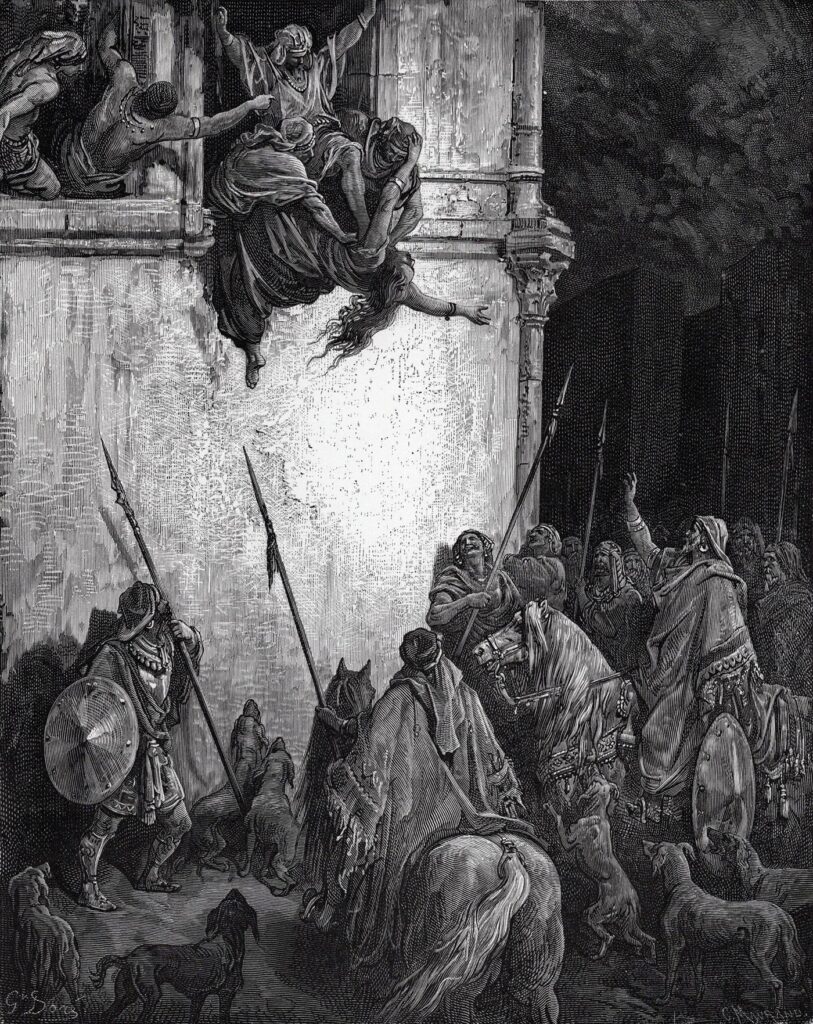Note: If you wish to receive, via e-mail, (1) my weekly newsletter or (2) daily copies of these posts, write to me at rrbates1951@gmail.com. Comments may also be sent to this address. I promise not to share your e-mail with anyone. To unsubscribe, write here as well.
Thursday
I’m laid up with a bad cold so today’s essay comes to you late. Having just heard about the death last week of comic novelist Tom Robbins, I am repurposing a post I wrote four years ago about his take on the Biblical figure of Jezebel. In the 2020 election, various Christian Trump supporters were accusing Kamala Harris of being a Jezebel so I used Robbins to show how this could be a compliment rather than an insult.
Jezebel is best known for arraying herself in all her beauty before being thrown out of a window in a palace coup. Anne Branigan in a Washington Post column reports that various Southern Baptist preachers were associating Harris with the queen in 2021, including Tom Buck and Steve Swofford. In a videotaped sermon, Swoffrod, after calling Joe Biden “cognitively dysfunctional,” asked, “What if something happens to [Biden] and Jezebel has to take over? Jezebel Harris, isn’t that her name?”
Branigan explains the significance:
The “Jezebel” reference is…highly specific, a trope that speaks to deeply entrenched views about power and what is “normal” or “traditional” in American culture, especially when it comes to racial and gender hierarchies….Calling Harris a Jezebel accomplishes multiple things: It delegitimizes her power and dehumanizes her.
According to William and Mary religious studies professor Jessica Johnson, whom Branigan interviewed for her article, “Jezebel” has historically been used as a justification for racial violence against Black women. Branigan notes that Christian nationalists, who are always searching for an authoritarian father figure, saw in “Jezebel Harris” their worst fears realized: “that they will be replaced; that their fate is in the hands of a godless, amoral Black woman.”
This view of Harris played no small part in the 2024 election. And what Tamura Loman says of Jezebel in Jezebel Unhinged can also be said of attacks on Harris: Jezebel, Loman points out, “never did anything sexual. They hated her for her power.” All the sexual connotations that were later attached to Jezebel were just further ways to “both undermine her and further highlight her deviance.”
Fundamentalists invoke Jezebel’s name in Robbins’s Skinny Legs and All. After fundamentalist preacher Buddy Winkler catches his daughter wearing lipstick and attending a life drawing class in her college, he and other members of the congregation set upon her, scrubbing her face until it’s raw while calling her a Jezebel. Robbins fights back with an historical explanation of Jezebel’s real crime. The queen, he writes, worshipped the earth goddess Astarte, who was
the Goddess, the Great Mother, the Light of the World, the most ancient and widely revered divinity in human history. Shrines to her date back to the Neolithic Period, and there was not one Indo-European culture that failed to remove with its kiss the mud from her sidereal slippers. In comparison, “God,” as we moderns call Yahweh (often misspelled “Jehovah”) was a Yahny-come-lately who would have approached her enormous popularity. She was the mother of God, as indeed, she was the mother of all.
It’s no surprise, then, that, when
King Ahab’s Phoenician bride started building shrines to Astarte, and when the Israelites started flocking to those shrines—the populace apparently favored Astarte’s voluptuous indulgence over Yahweh’s rigid asceticism—the patriarchs reacted violently against her.
Robbins provides an interesting side note:
[O]ne of the crimes charged to Jezebel, according to the historian Josephus, was the planting of trees. Since the Goddess always has been honored in sacred groves, it is understandable that patriarchs, then as now, leaned toward deforestation.
Because the devotion to Astarte was “contagious,” Robbins writes, and because “it weakened the grip of the Yahweh cult, “Jezebel” was slandered, framed, and finally murdered.” Robbins gives his own account of her death:
When the moment arrived, Jezebel was thoroughly aware that she was to be assassinated. She put up her ergot-black hair, donned her tiara, rouged her cheeks and lips, applied kohl to the lids of her huge Phoenician eyes, and went to face her killer with the style, dignity and grace befitting a reigning queen. So much for painted hussies.
While Harris fans were celebrating Harris’s infectious laugh and her multicultural background when she ran first for vice-president and then for president, we may have underestimated how she was triggering hatreds that went as deep as those directed against Barack Obama and Hillary Clinton. While there are scores of explanations as to why she lost to Donald Trump, the fact that she was an assertive black woman must figure prominently. Maybe what’s most amazing about the 2024 election is that she came as close as she did to winning.
At the end of Skinny Legs and All, Buddy Winkler attempts to strangle a Middle Eastern woman dancing the dance of the seven veils, with each veil representing one of the ways we blind ourselves to the richness of life and human possibility. Such men were active in Jezebel’s time, and they remain a lethal threat today.
Further thought: I’m thinking, in Trump’s attempted January 6 coup, that another powerful women–Nancy Pelosi–was in danger of being thrown from a window in a reenactment of the Jezebel murder.


